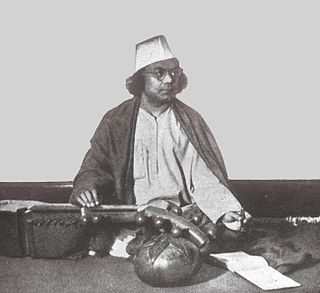
Kazi Nazrul Islam was a Bengali poet, writer, musician, and is the national poet of Bangladesh. Nazrul is regarded as one of the greatest poets in Bengali literature. Popularly known as Nazrul, he produced a large body of poetry, music, messages, novels, stories, etc. with themes that included equality, justice, anti-imperialism, humanity, rebellion against oppression and religious devotion. Nazrul's activism for political and social justice as well as writing a poem titled as "Bidrohī", meaning "the rebel" in Bengali, earned him the title of "Bidrohī Kôbi". His compositions form the avant-garde music genre of Nazrul Gīti.

Shamsur Rahman was a Bangladeshi poet, columnist and journalist. A prolific writer, Rahman produced more than sixty books of poetry collection and is considered a key figure in Bengali literature from the latter half of the 20th century. He was regarded as the unofficial poet laureate of Bangladesh. Major themes in his poetry and writings include liberal humanism, human relations, romanticised rebellion of youth, the emergence of and consequent events in Bangladesh, and opposition to religious fundamentalism.
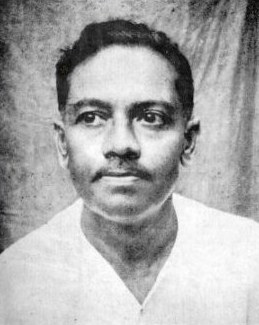
Jibanananda Das was an Indian poet, writer, novelist and essayist in the Bengali language. Popularly called "Rupashi Banglar Kabi'', Das is the most read poet after Rabindranath Tagore and Kazi Nazrul Islam in Bangladesh and West Bengal. While not particularly well recognised during his lifetime, today Das is acknowledged as one of the greatest poets in the Bengali language.

Malay Roy Choudhury is an Indian Bengali poet, playwright, short story writer, essayist and novelist who founded the Hungryalist movement in the 1960s.
Syed Ali Ahsan was a Bangladeshi poet, writer and university academic. He was awarded Ekushey Padak (1982) and Independence Day Award (1987) by the Government of Bangladesh. In 1987, he was selected as the National Professor of Bangladesh. He was credited as the official English translator of the National Anthem of Bangladesh.
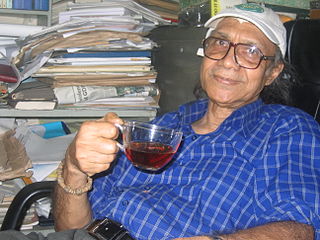
Abdul Mannan Syed was a Bangladeshi poet, and critic. He is known for his considerable research works on Kazi Nazrul Islam, Jibanananda Das, Farrukh Ahmad, Syed Waliullah, Manik Bandyopadhyay, Bishnu De, Samar Sen, Roquiah Sakhawat Hossain, Abdul Ghani Hazari, Muhammad Wajed Ali, Prabodh Chandra Sen. From 2002 to 2004, he had been the executive director of Nazrul Institute.

Asad Chowdhury is a poet, writer, translator, radio, television personality and journalist, as well as a cultural activist in Bangladesh. He won Ekushey Padak in 2013 and Bangla Academy Literary Award in 1987.

Rafiq Azad was a Bangladeshi poet, editor and writer. He is credited with 45 collections of poetry including Prakriti O Premer Kabita, Asambhaber Paye, Sahasra Sundar, Haturir Nichae Jiban, Khub Beshi Durea Noy, Khamakaro Bahaman Hey Udar Amiyo Batas and others. He is most well known for his poem "Bhaat De Haramjada" which was written during the famine of 1974. The poet participated in the war against the Pakistani occupation forces in 1971 Liberation War and was awarded ‘Notable Freedom Fighter Award” in 1997. He received Bangla Academy Literary Award in 1984 and national award Ekushey Padak in 2013, for his contribution to Bangla language and literature.
Hasan Hafizur Rahman became the editor of the Daily Bangla right after the Bangladesh Liberation War in 1971. He also worked for the government as a high official and edited an account of the independence struggle called The Liberation War of Bangladesh, which was published in sixteen volumes. He was the author of thirteen books including eight collections of poetry and Adhunik Kobi O Kobita, a book of critical essays.
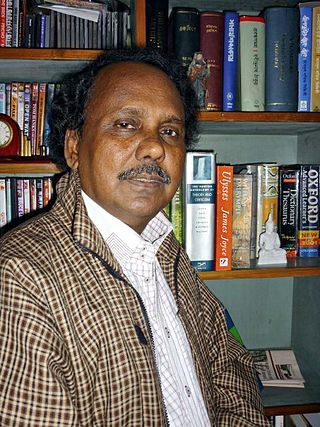
Khondakar Ashraf Hossain was a leading postmodernist poet, essayist, translator, and editor from Bangladesh. He wrote more than eighteen titles.
Sikdar Aminul Haq was a Bangladeshi poet. In recognition of his contribution in language and literature, the government of Bangladesh posthumously awarded him the country's second highest civilian award Ekushey Padak in 2020.

Shahabuddin Nagari is a modern poet of Bangladesh, who appeared in the 1970s and gained pre-eminence as a lyricist. According to literary critic Abdul Mannan Syed, "Shahabuddin Nagari is one of those few powerful poets of 1970s whose mastery of mixing romanticism with instinct is amazing". As of February 2016, he has published more than 75 titles. Nagari is most noted for his songs and works for the children. He was a senior bureaucrat of the government of Bangladesh. In 1971, he actively participated in the liberation war of Bangladesh.
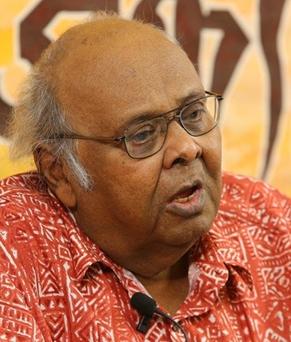
Shahid Quadri was a Bangladeshi poet and writer. For his poetry, he was awarded Bangla Academy Literary Award in 1973 and Ekushey Padak in 2011. His notable poems include "Uttoradhikar", "Tomake Obhibadon Priyotoma", "Kothao Kono Krondon Nei" and "Amar Chumbongulo Poucchey Dao".

"Bidrohi" is a popular revolutionary Bengali poem and the most famous poem written by Kazi Nazrul Islam in December 1921. Originally published in several periodicals, the poem was first collected in October 1922 in a volume titled Agnibeena: the first anthology of Nazrul's poems. Many have seen, in this poem, elements of romanticism, heroism, and love. Syed Ali Ahsan wrote that the poem was inspired by Walt Whitman's "Song of Myself".
Abdul Hye Sikder is a Bangladeshi poet. He is a former executive director of Nazrul Institute and vice president of Jatiya Nazrul Samaj. He received the Bangla Academy Literary Award in 2003.
M Harunur Rashid is a distinguished teacher of English literature and language, a notable educational administrator, editor and translator of modern poetry and prose, in Bangladesh, a noted writer of Sufism and Sufi literature and a commentator of social, political, cultural scene and literary texts.

Faizul Latif Chowdhury is a civil servant from Bangladesh, who currently serves as the director general of Bangladesh National Museum. Chowdhury has written on a variety of academic topics, including corruption in public administration, tax policy, economics of tax evasion and tax avoidance, smuggling, and international trade policy. He is also a translator of Bengali poetry, and has researched the modern poet Jibanananda Das. Currently he works at Independent University Bangladesh as adjunct professor business.
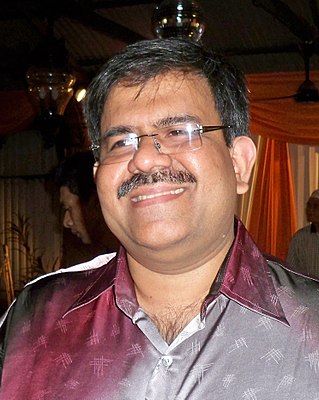
Aminur Rahman is a modern Bangladeshi poet who writes in Bengali. He is considered to be a Rabindranath Tagore follower. He is also engaged in literary translation and literary criticism.
Krishna Dhar, was an Indian poet, playwright, writer, journalist, columnist and teacher. He has written poetry alongside verse drama, nonfictional prose of varied nature and journalistic columns since the mid 1940s.
Ajit Kumar Dutta, known as Ajit Dutta, was a prominent Bengali poet, writer, essayist and professor.















